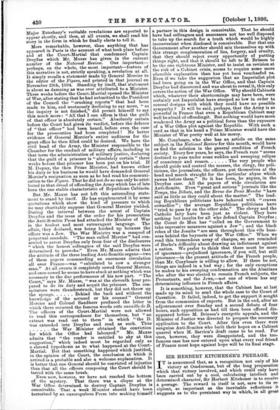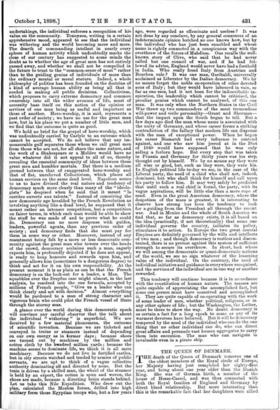SIR HERBERT KITCHENER'S PEERAGE.
IT is announced that, as a recognition not only of his victory at Omdurman, but of the long preparation which that victory involved, and which could only have been carried out by a cool, calculating intellect and determined character, Sir Herbert Kitchener is to receive a peerage. The reward in itself is not, save to its re- cipient, so important as the inevitable reflections it suggests as to the persistent way in which, in all great undertakings, the individual enforces a. recognition of his value on the community. Tennyson, writing in a certain apprehensive mood, appeared to see that the individual was withering and the world becoming more and more. The dearth of commanding intellect in nearly every sphere of human activity which undoubtedly marks the close of our century has suggested to some minds the doubt as to whether the age of great men has not entirely passed away, and whether we shall not be compelled in the future to trust to the "common-sense of most" rather than to the guiding genius of individuals of more than the ordinary mental or moral stature. Indeed, a whole philosophy of politics has been founded on the doctrine of a kind of average human ability as being all that is needed in making all public decisions. Collectivism, which proposes to carry extreme democracy and common ownership into all the wider avenues of life, must of necessity base itself on this notion of the opinion or services of one man being as useful and important as those of another. Hero-worship, it is said, represents a past order of society ; we have no use for the great man now, but in his place we put a number of little men, and we find that the outcome is quite as good.
We hold no brief for the gospel of hero-worship, which was undoubtedly carried by Carlyle to an extreme which cannot be accepted. We do not believe that any im- measurable gulf separates those whom we call great men from those who are not, for all share the same nature, and the work of a Shakespeare or a Moliere would have no value whatever did it not appeal to all of us, thereby revealing the essential community of ideas between these great men and humbler mortals. But there is a medium ground between that of exaggerated hero-worship and that of flat, unrelieved Collectivism, which places all human services on the same dead level. Napoleon seems to us to have divined the real nature and tendency of democracy much more clearly than many of the " ideolo- gists " he despised when he said that it meant " la carriere ouverte aux talents." Instead of conceiving the new democratic age heralded by the French Revolution as involving anything like a dead level, he supposed that it meant rather an intenser competition, but a competition on fairer terms, in which each man would be able to show the stuff he was made of and to prove what he could do. Democracy can no more dispense with guides, leaders, powerful agents, than any previous order of society ; and democracy finds that she must pay for them in some way or other. Moreover, instead of any resentment being felt by a more or less democratic com- munity against the great man who towers over the heads of the crowd, democracy acclaims such a man, eagerly expects him, is profoundly dejected if he does not appear, is ready to heap honours and rewards upon him, and generally allows him (sometimes to a dangerous degree) to think and act for it on his own responsibility. At the present moment it is as plain as can be that the French democracy is on the look-out for a leader, a Man. The squabbles over the Dreyfus case might almost, in the last analysis, be resolved into the one formula, accepted by millions of French people, " Give us a leader who can think clearly and act with decision." Almost everything would be pardoned to a man of strong character and vigorous brain who could pilot the French vessel of State through the stormy seas.
A glance over the world during this democratic epoch will convince any careful observer that the talk about the individual " withering " is superficial. We are deceived by a few material phenomena, the outcome of scientific invention. Because we are ticketed and conveyed in trains or steamers instead of depending on our own energy as in former days ; because shoes are turned out by machines by the million and cotton cloth by the kindred million yards ; because the machine seems to dominate life, we think it is all mere machinery. Because we do not live in fortified castles, but in city streets watched and tended by armies of public servants, we are apt to think of a vague collective authority dominating all and directed by none. But the train is driven by a skilled man, the wheel of the steamer is held by an expert, the cotton is spun and woven, the shoes are made, because a directing brain stands behind. Let us take this Nile Expedition. Who drew out the plan, calculated the Moslem forces, drilled into high military form those Egyptian troops who, but a few years ago, were regarded as effeminate and useless ? It was not done by any conclave, by any general consensus of an indeterminate opinion hatched no one knows how, but by the individual who has just been ennobled and whose name is rightly connected in a conspicuous way with the overthrow of the forces of Mandism. One recalls the well- known story of Clive, who said that he had never called but one council of war, and if he had fol- lowed its advice, England would never have had a foothold in India. Who really freed Italy from Austrian and Bourbon rule ? It was one man, Garibaldi, universally acclaimed as Liberator by the Italian democracy. We by no means forget the noble co-operation of other devoted sons of Italy ; but they would have laboured in vain, so far as one sees, had it not been for the indescribable in- spiration, the leadership which cannot be criticised, the peculiar genius which cannot be analysed, of this one man. It was only when the Northern States in the Civil War threw up two commanders of the most tremendous will-power and virile personality—Grant and Sherman— that the impact upon the South began to tell. But a few days ago died the man whose name is associated with the unity of Germany, and whose career forms a striking contradiction of the fallacy that modern life can dispense with the man of exceptional power. When he began his career Bismarck had every influence to contend against, and one who saw him jeered at in the Diet of 1849 would have supposed that he was only aiding a forlorn hope. But every step that was taken in Prussia and Germany for thirty years was his step, thought out by himself. We by no means say they were all wise or good, but, such as they were, they were his. In English political life to-day we see, in the case of the Liberal party, the need of a chief who shall not, indeed, domineer, but who shall think for himself and call upon his party to follow him. It may very safely be predicted that until such a real chief is found, the party, with its vague aspirations, will be little else than a mere rope of sand. Even in the great American democracy, where the despotism of the mass is greatest, it is interesting to observe how strong has been the tendency to look for a guiding from the President all through the recent war. And in Mexico and the whole of South America we find that, so far as democracy exists, it is all based on the idea (practically, if not theoretically) that some one individual governs the country, initiates its policy, stimulates it to action. In Europe the two great central Empires are definitely governed by the wills and intellects of two men ; and though democracy is restless and discon- tented, there is no protest against this system of sufficient strength to secure its overthrow. In short, look where we will among the democratic or quasi-democratic nations of the world, we see no sign whatever of the lessening value of the individual. On the contrary, the need of individual initiative and guidance is everywhere recognised, and the services of the individual are in one way or another rewarded.
This tendency will continue because it is in accordance with the constitution of human nature. The masses are quite capable of appreciating the accomplished fact, but some one person must have conceived and accomplished it. They are quite capable of co-operating with the work of some leader of men, whether political, religious, or in any other sphere of life ; but the Washington, the Luther, must be there to show the way. No doubt democracy is its warmest certain a fact for a long epoch to come as any of ts warmest devotees have believed. But it will be democracy tempered by the need of the individual who can do the one thing that no other individual can do, who can direct great affairs and persuade vast human aggregates to carry them into execution. The man who can navigate is invaluable even in a pirate ship.







































 Previous page
Previous page